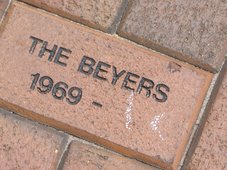Wednesday, October 15, 2008
NYT to Columbia: It's Rouse's Fault
From the New York Times DealBook blog:
It took only six weeks of negotiations for General Growth Properties, the nation’s second-largest shopping mall owner and operator, to agree to buy the Rouse Company in 2004 for $12.6 billion, a breathtaking price at the time.
Now that hasty decision, which drew immediate fire from Wall Street analysts, has come back to haunt General Growth and may lead to the sale of the 54-year-old company, whose widely known properties include Ala Moana Center in Honolulu, Water Tower Place in Chicago and the Grand Canal Shoppes at the Venetian in Las Vegas, The New York Times’s Terry Pristin reported.
General Growth’s acquisition of Rouse, which was known for its innovative planned communities like Columbia, Md., and its “festival marketplaces” like Faneuil Hall in Boston and the South Street Seaport in Manhattan, was financed almost entirely with short-term mortgage debt. This financing strategy, with debt equal to more than 70 percent of its capitalization, raised fears that General Growth, a real estate investment trust based in Chicago with more than 200 shopping centers, had become overleveraged — fears that have now been borne out. The deal included $5.4 billion of Rouse’s debt.
“They believed that credit markets would continue to be friendly and they would have ample opportunities to restructure their debt,” Keven S. Lindemann, the director of real estate for SNL Financial, a research company in Charlottesville, Va., told The Times. “But the capital markets turned against them.”
It took only six weeks of negotiations for General Growth Properties, the nation’s second-largest shopping mall owner and operator, to agree to buy the Rouse Company in 2004 for $12.6 billion, a breathtaking price at the time.
Now that hasty decision, which drew immediate fire from Wall Street analysts, has come back to haunt General Growth and may lead to the sale of the 54-year-old company, whose widely known properties include Ala Moana Center in Honolulu, Water Tower Place in Chicago and the Grand Canal Shoppes at the Venetian in Las Vegas, The New York Times’s Terry Pristin reported.
General Growth’s acquisition of Rouse, which was known for its innovative planned communities like Columbia, Md., and its “festival marketplaces” like Faneuil Hall in Boston and the South Street Seaport in Manhattan, was financed almost entirely with short-term mortgage debt. This financing strategy, with debt equal to more than 70 percent of its capitalization, raised fears that General Growth, a real estate investment trust based in Chicago with more than 200 shopping centers, had become overleveraged — fears that have now been borne out. The deal included $5.4 billion of Rouse’s debt.
“They believed that credit markets would continue to be friendly and they would have ample opportunities to restructure their debt,” Keven S. Lindemann, the director of real estate for SNL Financial, a research company in Charlottesville, Va., told The Times. “But the capital markets turned against them.”
Subscribe to:
Post Comments (Atom)





1 comment:
Some say that Tony Deering, then Rouse CEO, snookered GGP in the sale by insinuating that there was another buyer when there wasn't. This sort of helps explain why the deal went down so fast.
-wb
Post a Comment